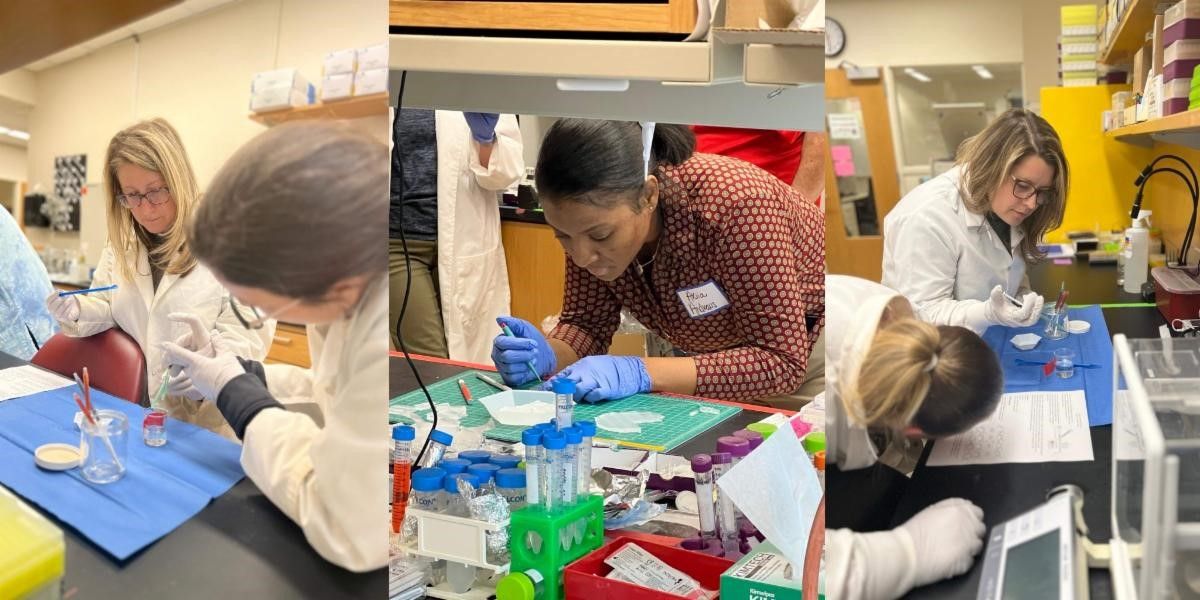Georgia Bio Receives Increase in State Funds for Teacher Training Initiative and Reveals Most Recent Impact Numbers
The program has reached 81,413 students and 519 teachers across Georgia.

Atlanta, GA (August 5, 2024) – Georgia Bio’s Biotech Teacher Training Initiative (BTTI), formerly known as the Rural Teacher Training Initiative (RTTI), secured a significant increase in state funding in Georgia’s Fiscal Year 2025 budget. Total state funding now sits at $500,000. This investment from the state will be matched by industry donations in both cash and equipment, bringing the value of this program to $1+ million. Prior to receiving this increase in funding, the program conducted its fifth year of career-relevant instruction via hands-on teacher learning, impacting nearly 30,000 students and 150 teachers. In its first five years, the program has reached 81,413 students and 519 teachers across Georgia. Going forward, in conjunction with the additional funding and gifts from industry, BTTI will be able expand its operations in the urban areas of the state, impacting even more teachers and students.
This programmatic increase will support several initiatives, including hosting an additional cohort of teachers annually in an urban area where the density of industry sits, such as Atlanta or Augusta, and expanding the Equipment Depot and access to lab equipment. Plans for increased access include opening one satellite science equipment loaning office in Northwest Georgia, developing a shipment option with matching private funding, and potential for another satellite location in South Georgia. Further, funds will be allocated toward collaborating with Southwest Georgia RESA to provide teacher training for new science teachers in areas struggling to fill teacher positions, offer training and career path information for guidance counselors on opportunities in the life sciences, explore curriculum enhancement to include medical devices, and network with existing teachers.
“Georgia Bio is the only organization in the State that offers this type of hands-on training program, complemented with classroom supplies and access to career pathway understanding,” said Maria Thacker-Goethe, President and CEO of Georgia Bio. “Investing in improving access to resources for educators can open life changing careers for students and be a boon to Georgia’s economy, and this increase in funding signifies that the State agrees. As the industry continues its rapid growth across the state, our companies need to know there is a workforce pipeline being developed and we help innovatively address that need. I am excited for the future of BTTI and grateful for the support of the State and members of our industry as we endeavor to build upon this program’s value and success.”
“With the explosive growth in biotechnology has come the heightened need for a qualified workforce,” says BTTI Instructor Stan Harrison, also Biotech Pathway Teacher at the Athens Community Career Academy and State Coordinator for the Biotechnician-Assistant Credentialing Exam (BACE). “We hear it echoed again and again that companies are struggling to hire and retain qualified production staff and therefore unable to manufacture high demand and often life-saving products. Quality training starts with highly trained secondary teachers who understand industry recognized standards. Georgia Bio’s BTTI provides a host of professional learning workshops and along with the Equipment Depot, a structured means to network and access cutting edge materials for modern lab training.”
BTTI is a public/private workforce development partnership between the life sciences sector and the State of Georgia. Led by Program Director, Megan Heaphy, BTTI offers hands-on, immersive science teacher professional development for Georgia teachers state-wide. Curriculum is built to highlight and leverage the biotechnology that exists within traditional science courses, including biology and AP biology, chemistry and AP chemistry, physics, environmental biology, agriculture and horticulture, physical science, and life science.
About Georgia Bio
Georgia Bio (GaBio) is the state’s most impactful life sciences membership organization, advocating for the sector and its diverse innovation pipeline. For over 30 years, GaBio has served its members by supporting companies of all sizes, from early-stage innovators and startups to established industry leaders in biotechnology, pharmaceuticals, and medical technology. GaBio also works closely with universities, academic and research institutions, the investment community, and other critical partners that promote this vibrant sector. GaBio works to shape public policy, improve access to breakthrough technologies, educate lawmakers, provide member programs, strengthens the workforce pipeline, and advance equity within our ecosystem by championing innovative solutions for some of the most pressing challenges of our times. For more information, visit www.gabio.org.
MEDIA CONTACT:
Melissa Carter
404-920-2043





